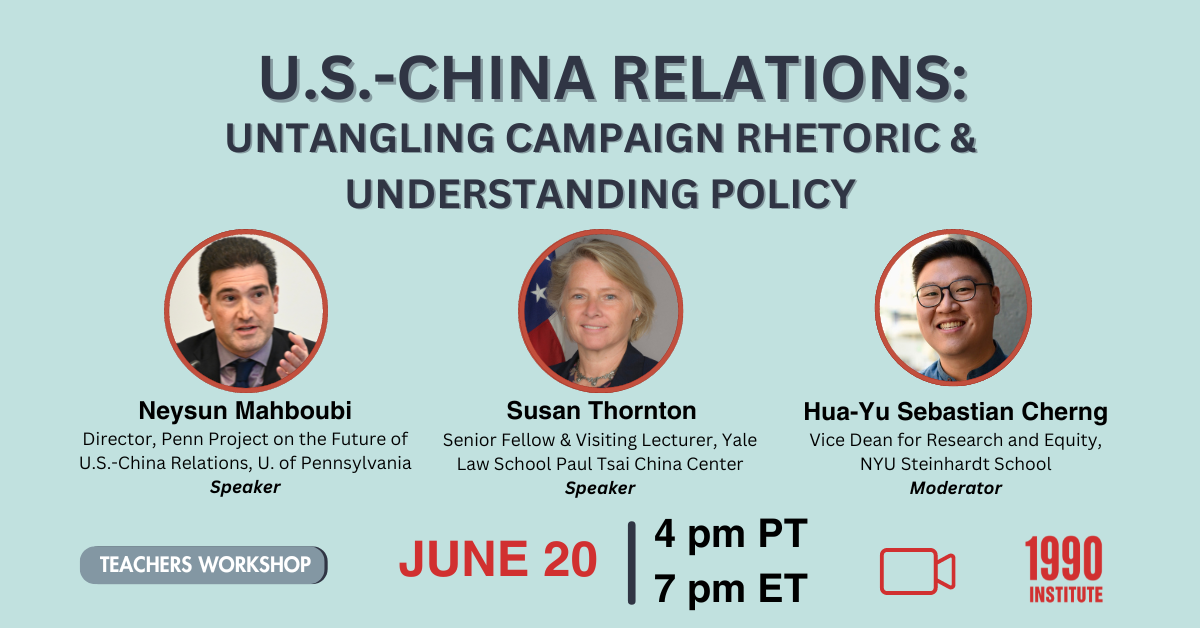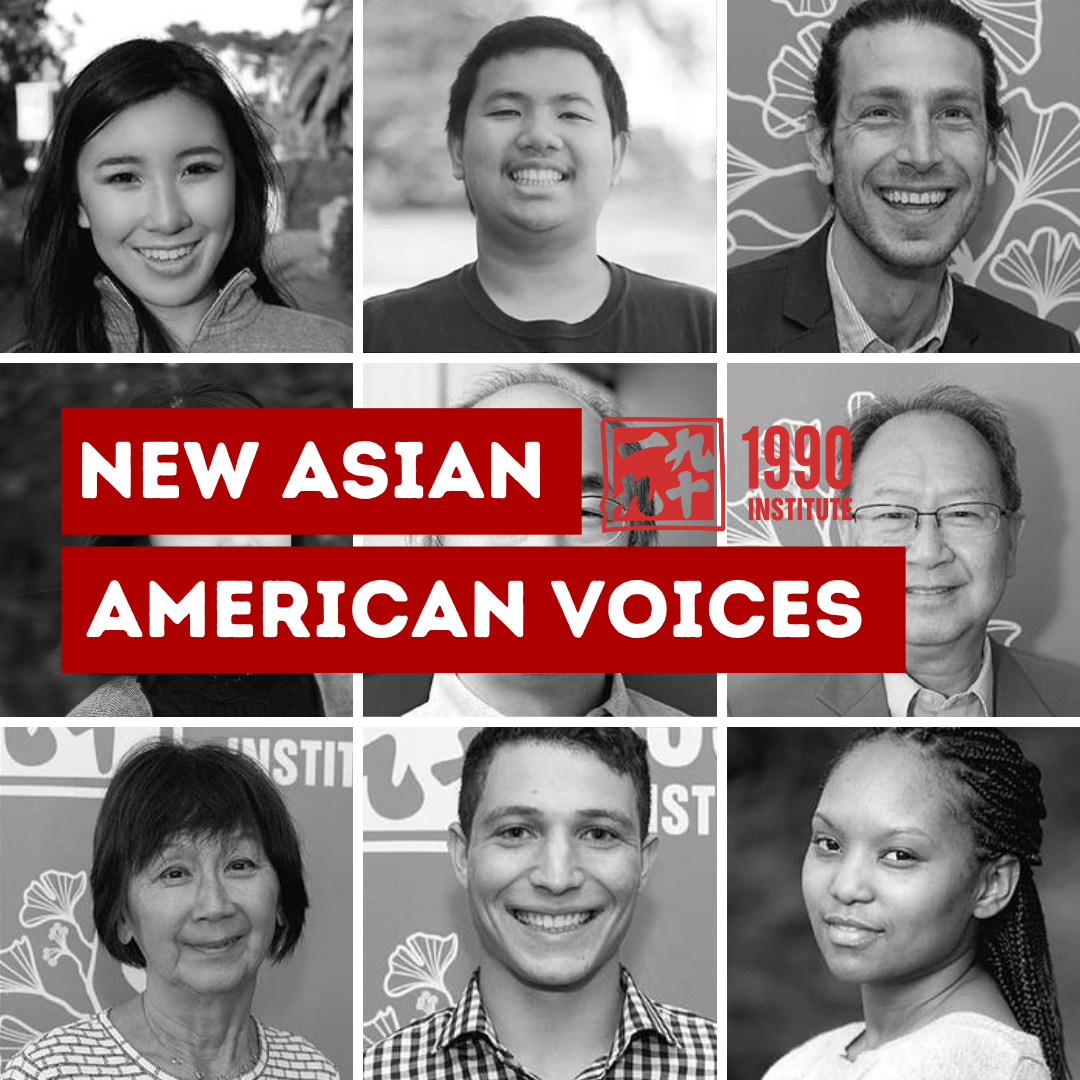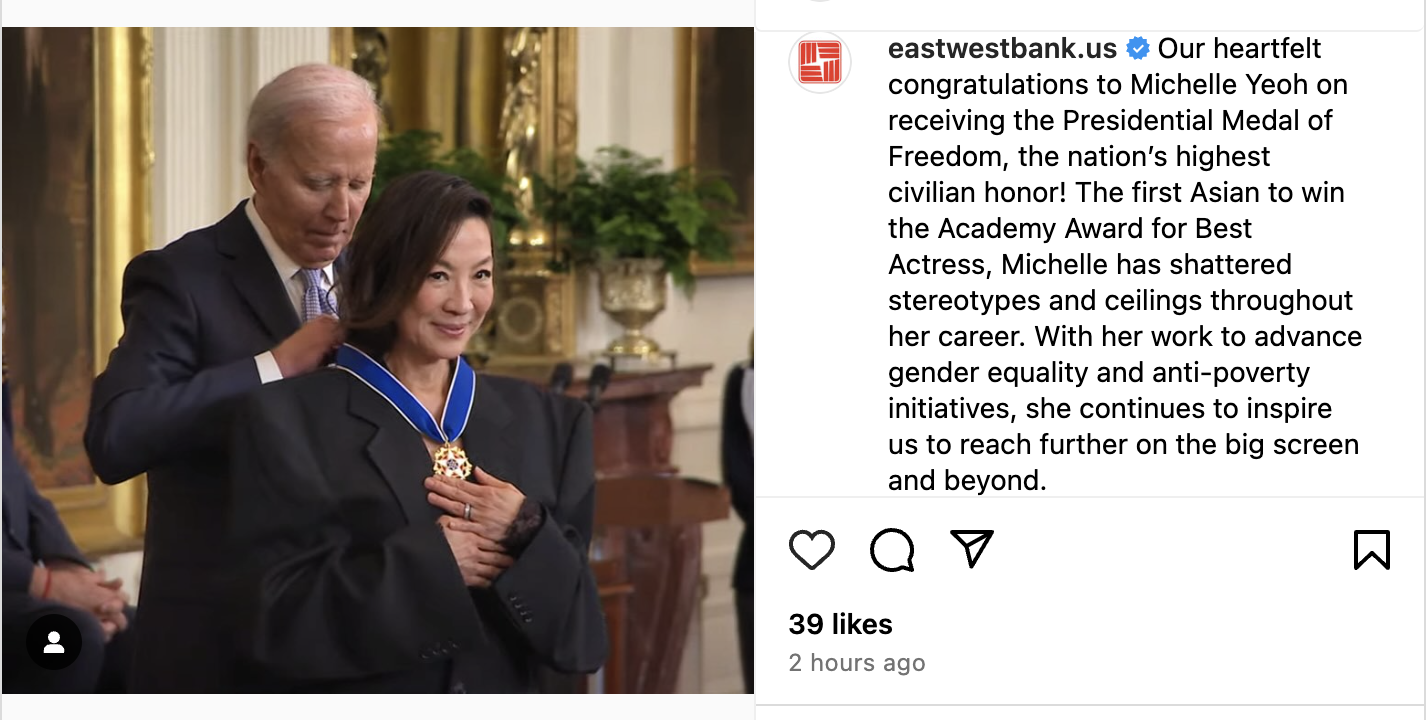| | | | Dear Friends, Happy Asian American, Native Hawaiian, and Pacific Islander (AANHPI) Heritage Month! Looking for thought-provoking and engaging activities and lesson plans for your students? We have a free, downloadable lesson plan on Asian American Identity exclusively created for the 1990 Institute for teachers who are preparing to teach lessons in AANHPI history and culture. Sections include understanding the history of stereotypes, such as the model minority myth, perpetual foreigner, yellow peril, and more, along with fun and accessible topics including food (boba, kimchi, matcha, etc.) and music (K-Pop). Be sure to check out our social media where we have short videos on AANHPI Month, why it’s in May, a brief history of exclusion laws faced by Asians looking to call America home, spotlights on unsung Asian Americans, and so much more. (Links to our social media accounts are at the bottom of every newsletter.) We are seeking secondary school students who would like to submit an Asian American story to be published on New Asian American Voices and teachers who can share this opportunity with their students. These stories can include, but are not limited to, notable deeds, accomplishments, innovations, positive influences, valuable efforts, and/or meaningful actions that have purpose and significance for a particular community or the greater good. Please visit our program webpage for details on requirements. We encourage students to include original work, such as a short video or other creative expressions including poetry, music, song lyrics, spoken words, art, animation, etc. We are open to your ideas! Please contact us at naav@1990institute.org with any questions. Our new Teachers Workshop on June 20 will feature expert speakers who will discuss important strategic issues shaping U.S.-China relations, including trade, technology, and education. In today’s interconnected world, we offer this workshop to address the needs of the many middle and high school educators who are interested in deepening their understanding of U.S.-China relations, untangling political rhetoric from actual policies, and incorporating this knowledge into their teaching. All who are interested are welcome to register. Scroll down to Spotlight to learn more. We rely on individual contributions to sustain and grow our nonprofit programming which supports teachers and students. If you are able to make a charitable contribution of any amount, we would be so grateful to continue our work. Please share our newsletters with your friends and family and encourage them to subscribe. |
| |  |
|
| Register now for our Teachers Workshop on untangling campaign rhetoric versus policy in U.S.-China relations. Check out the details in Spotlight below. |
| | Bridging differences through contact By Denise Yiran Zheng
Many studies have shown that intergroup contact can greatly reduce prejudice. As a social psychologist, I have focused on researching ways to foster better relations between diverse groups of people – which is why it’s alarming to me that a potential solution like student exchanges between the U.S. and China have not been fully restored in an effort to quell some of the tensions that currently exist between the two countries. Indeed, in recent years, the number of American students studying in China has fallen sharply. Only 211 Americans studied in mainland China during the 2021-22 academic year – with reports that there were 700 American students studying at Chinese universities at the end of 2023 – down from around 14,000 10 years ago. In contrast, 53 percent of international students in the U.S. were from China (289,526) and India (268,923) in 2022-23. These statistics show a wide gap in the number of exchange students between the U.S. and China. In November 2023, President Xi Jinping announced a plan to welcome 50,000 young Americans to study in China over the next five years to promote youth exchanges between the two countries. The current American ambassador to China, Nicholas Burns, has similarly called for U.S. students to go to China and learn Mandarin and the history and culture of China. But we’ve yet to take concrete action toward these steps, as with the example of the Fulbright Program, which continues to not list China as one of the eligible countries for this type of academic exchange. Moreover, despite the Biden administration ending the China Initiative in 2022, scientists of Chinese ethnicity remain scared of being targets of racial profiling. The arrest of Dr. Xi Xiaoxing, who was falsely accused amid increasing concerns about economic espionage, and the firing of 103 Chinese scientists under the National Institutes of Health (NIH) investigation, set chilling examples for the scientific community. The prospect of losing careers may further deter scientists from international collaboration with the looming possibility of their work being scrutinized for threatening national security. As one of the many scientists advocating for open science, which depends on free exchanges of ideas and resources, I'm concerned about how the aforementioned fears and suspicions can prevent us from sharing the benefits of scientific research with the greater community. It is imperative to encourage young people in the U.S. to learn about China directly, and vice versa for Chinese youth about the U.S. As future leaders, they must attain skills in a nuanced understanding of the countries’ and their people’s diversity and complexity to collaborate on pressing global issues of our time. And it is time to create engaging, supportive environments to encourage exchanges of people and resources; the future of innovation and scientific and cultural advances are at stake. |
| |
|
|  | To elevate AAPI studies and the Asian American community in middle and high school classrooms, we are inviting secondary school teachers to engage with their students in actively learning about the significant and positive impact that Asian Americans continue to have on American life. Please visit our website for information on launching a lesson or activity in your classrooms. For more on the benefits of the New Asian American Voices program for your students, scroll down to Spotlight. |
| | |
|
| Nearly 50 years later, Asian American and Pacific Islander month features revelry and racial justice | AP News AANHPI Heritage Month is not just about showcasing festive fare like food and fashion but hard subjects like grief and social justice. The rise of anti-Asian hate during the pandemic only heightened that effort. About 4 in 10 Americans see China as an enemy, a Pew report shows | PBS NewsHour 42 percent of Americans label China as an enemy, according to an annual Pew Research Center survey. Half of Americans think of China as a competitor, and only 6 percent consider the country a partner. Asian Americans and Pacific Islanders in U.S. more likely to believe in climate change, AP-NORC poll says | AP News Asian Americans, Native Hawaiians, and Pacific Islanders are more likely than the general U.S. adult population to believe in human-caused climate change. For more on what can be done on climate change, see the 1990 Institute’s video “Why are Chinese and Americans the Key to Life on Planet Earth?” Half of America can’t name a famous Asian American actor or event, survey finds | WRBL 52 percent of those surveyed couldn’t name a famous Asian American actress or political figure, according to a 2024 STAATUS Index survey from nonprofit The Asian American Foundation. Another 55 percent said nothing came to mind when it came to naming an event or policy related to the history or lives of Asian Americans. U.S., China to hold first AI talks within ‘weeks’ amid ongoing TikTok stalemate | CNBC During wide-ranging talks with Chinese officials in Beijing, U.S. Secretary of State Antony Blinken said the two sides had agreed to the first U.S.-China intergovernmental dialogue on AI to discuss the risks and safety concerns surrounding the emerging technology. A massive Powerball win draws attention to a little-known immigrant culture in the US | AP News “I am born in Laos, but I am not Laotian,” Cheng “Charlie” Saephan said at a news conference where his identity as one of the jackpot’s winners was revealed. “I am Iu Mien.” Chinese students in U.S. tell of ‘chilling’ interrogations and deportations | The Guardian As tensions with China rise, scientists at America’s leading universities complain of stalled research after crackdown at airports. Far fewer young Americans now want to study in China, something both countries are trying to fix | The Independent Some young Americans are discouraged from investing their time in China by what they see as diminishing economic opportunities and strained relations between Washington and Beijing. Southeast Asian Americans face the brunt of racist attacks among Asians in U.S., new study finds | NBC News While many Americans believe anti-Asian hate has passed, experts say many communities are still living in fear. A report from The Asian American Foundation revealed that Southeast Asian Americans face assault, verbal abuse, and threats more than any other Asian American group. China launches historic mission to retrieve samples from far side of the moon | Reuters China launched an uncrewed spacecraft on a nearly two-month mission to retrieve rocks and soil from the far side of the moon, the first country to make such an ambitious attempt. New book chronicles half-century of Asian American life, through the lens of one photographer | NBC News “Corky Lee’s Asian America” pays tribute to history in the making and to a documentary giant. His family gave the 1990 Institute permission to use his photographs in our video “Exclusion: The Asian American Experience.” Read more about Corky Lee, the self-proclaimed unofficial Asian American Photographer Laureate, on New Asian American Voices. LISTEN: The State of the World, Ep. 1: China | University of California Institute on Global Conflict and Cooperation (IGCC) In this first episode of the podcast, China experts Susan Shirk (a member of the 1990 Institute’s Advisory Council) and Tai Ming Cheung, former and current IGCC directors respectively, discuss the history of cooperation between the U.S. and China and the need to move forward in the relationship. Hear more episodes of The State of the World. |
| | It's AANHPI Heritage Month! Check out our New Asian American Voices program highlighting Asian American individuals and collectives who have made significant strides in all sectors of U.S. society. |
|
|
| |
|
| | - REGISTER FOR “U.S.-CHINA RELATIONS: UNTANGLING CAMPAIGN RHETORIC AND UNDERSTANDING POLICY” ON JUNE 20 – Join us for a dynamic workshop designed to support middle and high school educators in navigating the complexities of U.S.-China relations. This workshop will focus on untangling political campaign rhetoric and comparing it to actual policies, providing educators and their students with a deeper understanding of this critical geopolitical dynamic. Don't miss this opportunity to gain valuable insights and resources for teaching about one of the most important geopolitical relationships of our time. Register for “U.S.-China Relations: Untangling Campaign Rhetoric and Understanding Policy” with our esteemed panel:
- Neysun Mahboubi: Director of the Penn Project on the Future of U.S.-China Relations at the University of Pennsylvania
- Susan Thornton: Retired senior U.S. diplomat with almost three decades of experience with the U.S. State Department in Eurasia and East Asia – and currently a Senior Fellow and Visiting Lecturer in Law at the Yale University Law School Paul Tsai China Center, Director of the Forum on Asia-Pacific Security at the National Committee on American Foreign Policy, and a Non-Resident Fellow at the Brookings Institution
- Ha-Yu Sebastian Cherng (moderator): Vice Dean for Research and Equity and Associate Professor of International Education at the New York University Steinhardt School of Culture, Education, and Human Development
- WELCOMING TEACHER ENGAGEMENT AND STUDENT SUBMISSIONS FOR NEW ASIAN AMERICAN VOICES – Our New Asian American Voices program aims to provide much-needed Asian American visibility and representation by highlighting Asian American individuals and collectives who have made significant strides in all sectors of U.S. society. We have posted hundreds of short biographies sharing the impact that Asian Americans have had and continue to have on American life. We are now accepting Asian American stories from middle and high school students. This program integrates AAPI and ethnic studies academic learning with real world skills in research, communications, creative development, media literacy, intellectual property/legal concepts, project management, and teamwork. If you’re a secondary school teacher or a student, learn how to submit a story.
- ASIAN AMERICAN TRAILBLAZERS – For AANHPI Heritage Month, we are continuing to highlight unique stories, such as Jensen Huang’s, who immigrated to the U.S. from Taiwan to live with relatives when he was a child and worked as a dishwasher as a teen. Since 1993, as Nvidia’s president and CEO, he grew the company from a start-up with two friends to a $2 trillion company on the cutting edge of AI technology. Over the years, he has been named the world’s best CEO by multiple publications. Also, read about award-winning journalist Alina Cho, currently with CBS Sunday Morning, who helped bring fashion to mainstream news. Growing up in an area with few Asian Americans, she struggled to feel she belonged; but with the popularity of K-Beauty and K-Pop, she recently said, “I think it’s pretty clear that it’s never been cooler to be Korean.” Follow New Asian American Voices for more inspiring stories. And for more on how Asian American identity continues to evolve, watch the recording of our Teachers Workshop titled “Asian American Identity: At the Intersection of Perpetual Foreigner and Pop Culture Trendsetter.”
|
| | Dim Sum - A Little Bit of Heart |
|  | |
|
|
|
| | | | 1990 Institute
P.O. Box 383 | San Francisco, California 94104
contact@1990institute.org www.1990institute.org Copyright 2023 The 1990 Institute. All rights reserved. |
| | | |
|
| |
|
|